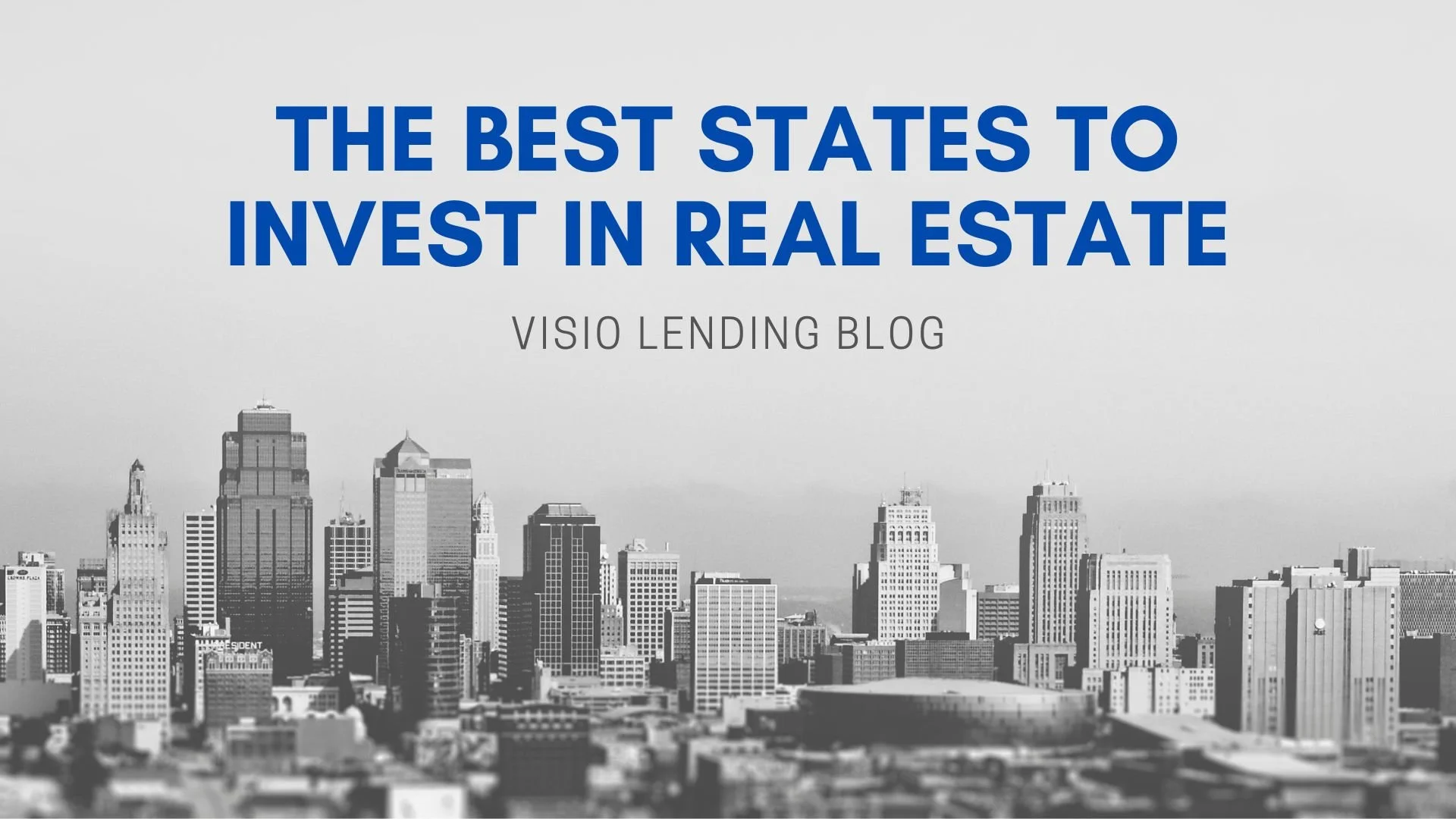Real estate investing is an excellent way to boost your cash flow and benefit from rising property values. But for a genuinely satisfying return on investment, it’s essential to buy investment property in the best real estate markets.
Each state offers unique opportunities and challenges, so real estate investors must know the best states to invest in real estate. Visio Lending has kickstarted your research by listing the top 15 US states to buy investment properties in, based on a comprehensive blend of vital real estate statistics.
Now that we’ve taken a quick look at each of your options for real estate investing, let’s do some comparisons. You can use the average property value and rent with our convenient rental calculators, inputting your loan agreements, fees, and taxes to see your return on investment.
|
State |
Property Value |
Average Rent |
|
Idaho |
$434,224 |
$1,024 |
|
Missouri |
$235,844 |
$1,250 |
|
South Carolina |
$359,000 |
$1,135 |
|
Tennessee |
$309,913 |
$1,035 |
|
New Jersey |
$495,469 |
$2,500 |
|
Florida |
$392,000 |
$1,790 |
|
Indiana |
$228,879 |
$1,009 |
|
Texas |
$296,127 |
$1,850 |
|
Georgia |
$319,158 |
$1,274 |
|
Alabama |
$221,428 |
$1,400 |
|
Kentucky |
$196,580 |
$1,259 |
|
New Mexico |
$291,722 |
$1,625 |
|
Colorado |
$528,285 |
$2,150 |
|
Arizona |
$422,243 |
$1,619 |
|
Arkansas |
$197,411 |
$1,335 |
Now, let’s take a look at average property taxes, which can greatly impact your overall investment strategy. We’ve ranked our 15 state picks from lowest to highest property tax rates.
|
Average Property Tax Rate by State | |
|
Alabama |
0.37% |
|
Colorado |
0.48% |
|
Arizona |
0.51% |
|
South Carolina |
0.55% |
|
Tennessee |
0.56% |
|
Arkansas |
0.57% |
|
Indiana |
0.75% |
|
New Mexico |
0.78% |
|
Kentucky |
0.8% |
|
Georgia |
0.81% |
|
Missouri |
0.88% |
|
Idaho |
0.89% |
|
Florida |
0.98% |
|
Texas |
1.6% |
|
New Jersey |
2.26% |
Lastly, let’s consider the benefits and downsides for each state.
-
- Idaho – It’s a fast-growing state both population- and economy-wise, but it has a low renter population.
- Missouri – It has good landlord laws and consistent economic growth, but taxes are a bit higher than in other states.
- South Carolina – It has low taxes and a strong job market, but rents are low in comparison to property prices.
- Tennessee – Home values are rising steadily, and taxes are low, but the population isn’t growing very quickly.
- New Jersey – NJ has a very large percentage of renters with high incomes, but taxes are also very high.
- Florida – It has high rents, good job opportunities, and a steady population climb, but taxes are higher than elsewhere.
- Indiana – It boasts good landlord laws and cheap property, but rents are relatively low.
- Texas – It has strong growth demographically and economically, combined with low property prices and high rents. However, taxes are some of the highest on this list.
- Georgia – It has a low cost of living and good job prospects, but rent is slightly lower than the national average.
- Alabama – It has very low taxes and great landlord-friendly laws. However, the population is slow-growing, and the median income is relatively low.
- Kentucky – Kentucky is affordable, and laws are advantageous to landlords. At the same time, there has been little migration into the state, and property taxes are a little higher than in surrounding states.
- New Mexico – NM has high rents and strong job growth but also high unemployment and low income.
- Colorado – Low taxes and high rents, but property is very pricey, and it is pretty competitive.
- Arizona – Arizona is growing quickly, and taxes are low. At the same time, it’s expensive to purchase, which can deter new investors.
- Arkansas – A good budget place to buy, especially as taxes are pretty low and landlords are favored by tenancy laws. However, it’s not a fast-growing state, which may hinder the market.
Future Outlook for Real Estate Investment in These States
Let’s take a look forward in each of these areas with a summary of what’s coming in the marketplace.
- Idaho – The housing stock is dwindling in this state, with a 27.2% decrease in houses on the market. This, coupled with an influx of new residents, suggests that the housing market will get very competitive soon. It’s best to buy now before prices go up further!
- Missouri – The housing stock in Missouri is incredibly low, with only a month’s supply. As interest rates are not expected to drop, this is the best time to get involved in the market. Developers will benefit from building new properties to reduce the housing crunch.
- South Carolina – Houses are staying on the market for a bit longer here than they were last year, while home sales have decreased by 11%. This suggests the market is slowing down, but not to worry — prices are still up and are expected to continue rising.
- Tennessee – Prices continue to increase in this area, but there is a relatively healthy housing supply of 3 months. It’s important to note that recent legislation has made it more difficult to evict tenants — you must now provide a 60-day warning.
- New Jersey – Housing inventory is very low, and the market is incredibly competitive. There have also been large investments in developing low-income housing, making this a good opportunity to provide economic options for those with smaller household incomes.
- Florida – Sunshine State remains a seller’s market, which is not expected to change in the next five years. However, climate concerns may make new renters shy away from the state, making it essential to invest in climate resiliency for your new rental.
- Indiana – Houses are very scarce in Indiana, with only a two-month supply. This will push prices higher, but it will also encourage many renters to remain in a rental property. The legislature is pushing laws that will limit security deposit amounts, which landlords should keep an eye on.
- Texas – Housing supply has recently rebounded, making it a buyer’s market. As this remains an in-demand state, there is no better time than now to get involved, especially as prices have stabilized significantly.
- Georgia – Over 24% of homes are selling above their asking prices due to very low stock, which can make it a challenge to get involved in this market. The major boost in prices is not likely to go away anytime soon, so you should consider investing now before the market heats up even more.
- Alabama – Other investors are starting to notice this excellent market, leading to a huge jump in prices. Don’t let high interest rates scare you away — seek out a good lender company like Visio Lending and get into this market before it rises even more.
- Kentucky – Bluegrass State is likely to remain very affordable for the long term. Prices have declined slightly over the past year thanks to a post-pandemic slump. However, do note that landlord laws are likely to swing in favor of tenants soon, with more restrictions on what you can demand upfront.
- New Mexico – Prices are still rising in this state, so you need to act fast before they go any higher. However, rising rates have started slowing down the market, giving buyers some breathing room. Starting next year, you will need to give a written notice explaining why you are evicting a tenant, and there will be tighter restrictions on deposits.
- Colorado – This market is finally cooling down a bit, which makes it a great time to get started in your Rocky Market dream. The legislature is working to reduce discrimination in the rental industry, so be advised about what you can ask potential tenants.
- Arizona –Grand Canyon State expects a modest price rise over the next year, but the market will remain relatively stable. You’ll now need a court order to evict tenants and give them a 30-day advance notice of rent increases.
- Arkansas – Unlike other states, Arkansas is about to get even more affordable, with prices dropping slightly in the coming year. There aren’t many major changes on the horizon concerning landlord rights, so you can breathe easy in that regard.
Conclusion and Key Takeaways
Each state is a little different and is growing on its own trajectory, which is why it’s crucial to stay abreast of developments in your preferred state. A real estate agent can be beneficial as you perform your due diligence on your chosen real estate market.
While this is a thorough overview, each state has its own niches and subsets, so you’ll need to narrow things down further as you prepare to take on tenants.
If you’re ready to get started with real estate, you can always rely on Visio Lending. Contact us today to learn more about our no-nonsense rental loans, made just for real estate investors.






